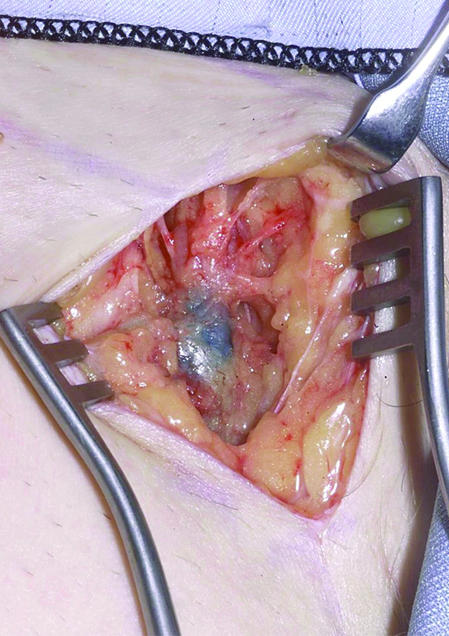Editor—In their review of the surgical management of metastatic inguinal lymphadenopathy Swan et al describe sentinel lymph node biopsy as a promising technique, which may refine the indications for inguinal lymphadenectomy and provide better prognostic information, and reduce morbidity.1
Figure 1.

Current UK melanoma guidelines on the role of sentinel nodes in melanoma are inadequate.2 Sentinel node biopsy remains a contentious issue with current guidelines recommending it is offered in the context of a clinical trial. It is becoming an integral part of the management and staging of primary melanoma despite no proved survival benefit. To assess the cost to the NHS for sentinel node biopsy for melanoma, we reviewed 100 consecutive patients in our unit. We assessed the costs of inpatient stay, theatre time, histology, nuclear medicine, follow up, completion lymphadenectomies, and the management of complications. Our calculated total cost of sentinel node biopsy was £1550 per patient. If sentinel node biopsy was offered to the 3600 newly diagnosed intermediate and thick melanoma patients annually in the United Kingdom,3 the NHS would face an estimated annual cost of £5.6m. Increased provision will need to be made in every centre managing melanoma, or centres with existing facilities will need additional resources.
Developing a sentinel node service, which includes nuclear medicine staffing, is a substantial cost with no proved survival benefit. The financial implications for the NHS of sentinel node biopsy in the management of malignant melanoma warrant its inclusion in the service guidance for the management of skin tumours including melanoma that the National Institute for Clinical Excellence is preparing.4
Competing interests: None declared.
References
- 1.Swan MC, Furniss D, Cassell OD. Surgical management of metastatic inguinal lymphadenopathy. BMJ 2004;329: 1272-6. (27 November.) [DOI] [PMC free article] [PubMed] [Google Scholar]
- 2.Newton Bishop JA, Corrie PG, Evans J, Gore ME, Hall PN, Kirkham N, et al. UK guidelines for the management of cutaneous melanoma. Br J Plast Surg 2002;55: 46-54. [DOI] [PubMed] [Google Scholar]
- 3.Office for National Statistics. Cancer Registration Statistics, England 2000. London: ONS, 2003.
- 4.National Institute for Clinical Excellence. Clinical guidelines in progress: skin cancer including melanoma. http://www.nice.org.uk/page.aspx?o=33927 (accessed 12 February 2005).


